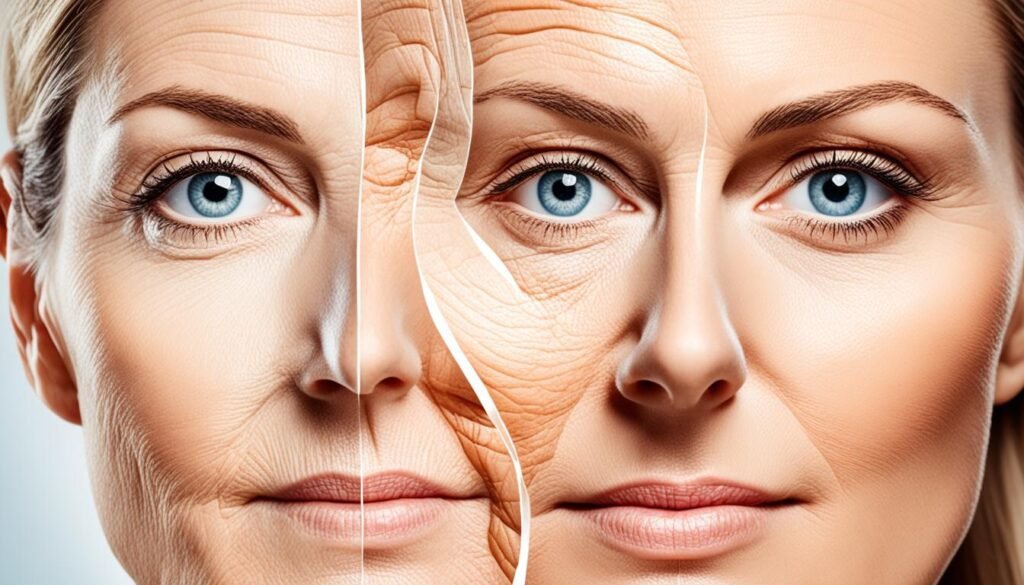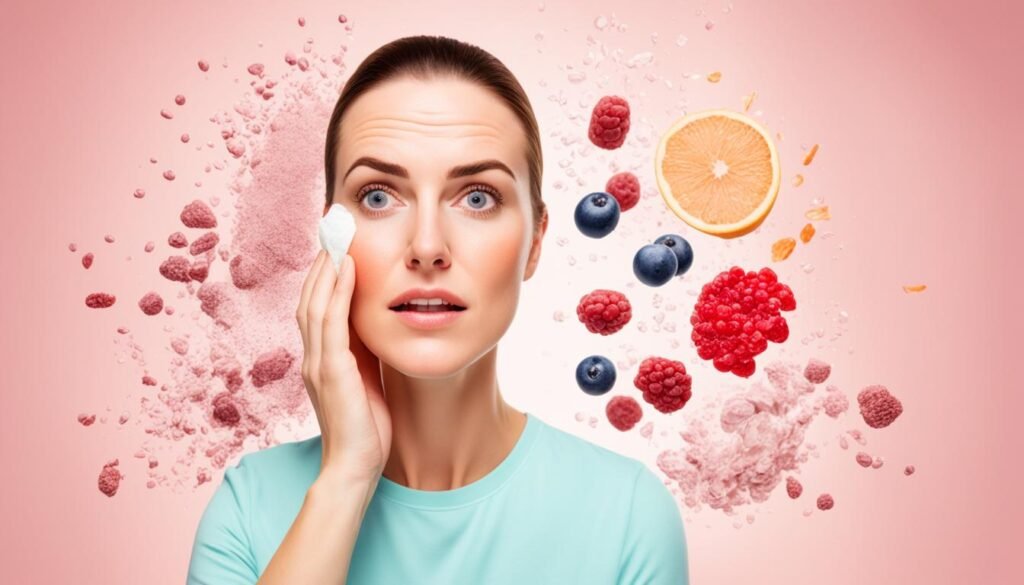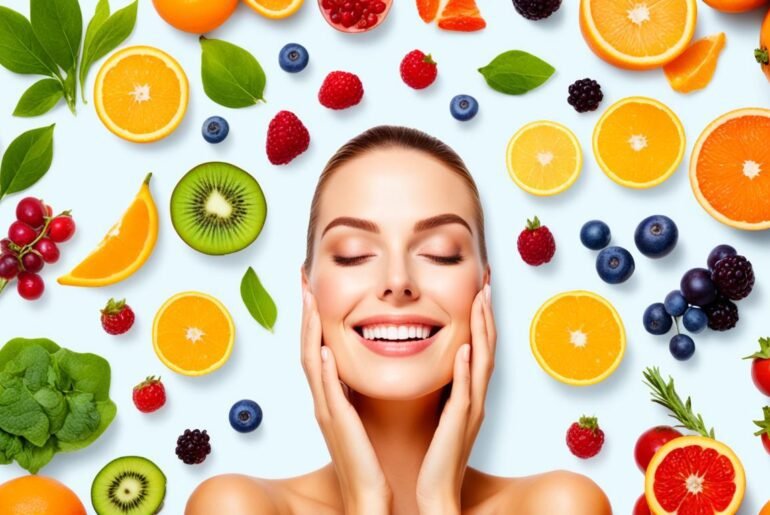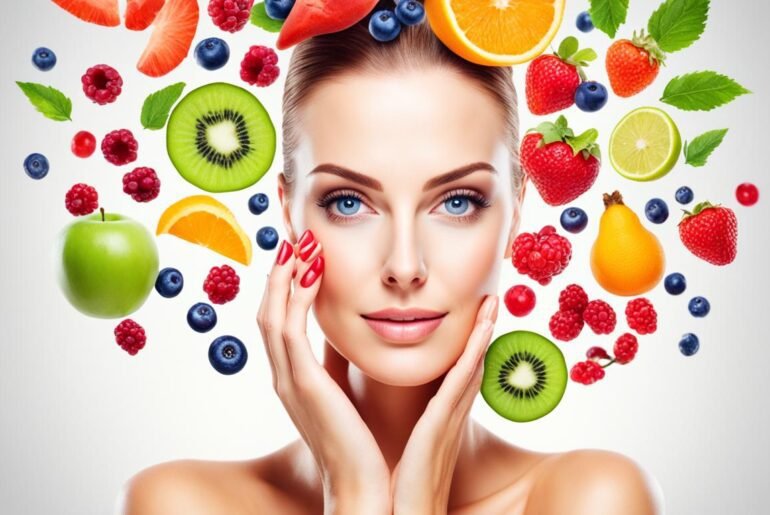Did you know that the signs of aging can be minimized with the help of antioxidants in skincare? Yes, it’s true! Research has shown that incorporating antioxidants into your skincare routine can have significant benefits in preventing and reducing the visible effects of aging on your skin. So, if you’re looking for a natural and effective way to maintain youthful and radiant skin, antioxidants may be the key you’ve been searching for.
Antioxidants, such as vitamins A, C, and E, selenium, carotenoids, and flavonoids, have been found to be powerful ingredients that can fend off signs of aging and improve skin health. They work by preventing or slowing down cell damage caused by free radicals and oxidative stress, which are major contributors to the aging process.
Key Takeaways:
- Antioxidants in skincare have been shown to prevent or slow down cell damage caused by free radicals and oxidative stress.
- Vitamins A, C, and E, selenium, carotenoids, and flavonoids are powerful antioxidants that can improve skin health and fend off signs of aging.
- Topical application of antioxidant-rich skincare products can help protect the skin from UV radiation, improve hydration, stimulate collagen production, reduce wrinkles, and enhance skin health and appearance.
- Natural antioxidants found in fruits, vegetables, and herbs can also contribute to younger-looking skin when included in a balanced diet.
- Sunscreen is essential in combination with antioxidant skincare to protect the skin from harmful UV radiation.
How Antioxidants Help with Aging Skin
Antioxidants play a crucial role in combating the aging process and promoting youthful, healthy skin. They offer a range of benefits that contribute to maintaining a vibrant complexion and preventing signs of aging. Here’s how antioxidants help with aging skin:
Neutralizing harmful free radicals
Antioxidants help protect the skin from harmful free radicals, which are unstable molecules that can cause damage to the skin cells. By neutralizing these free radicals, antioxidants prevent them from causing oxidative stress and DNA damage.
Reducing UV damage
Exposure to UV radiation from the sun can accelerate skin aging. Antioxidants help combat this damage by reducing DNA damage from UV light. They act as a shield, protecting the skin from the harmful effects of UV rays.
Boosting collagen production
Collagen is a protein that provides structure and elasticity to the skin. As we age, collagen production naturally decreases, leading to the formation of wrinkles and sagging skin. Antioxidants stimulate collagen production, helping to maintain firmness and elasticity.
Preventing wrinkles and pigmentation
Antioxidants help prevent the formation of wrinkles and minimize pigmentation by reducing the breakdown of collagen and elastin fibers in the skin. This leads to a smoother, more even complexion.
Supporting healing processes
When the skin is damaged, antioxidants play a vital role in supporting the healing process. They can help speed up wound healing and reduce inflammation, promoting a faster recovery.
Improving hydration
Antioxidants have hydrating properties that can improve moisture levels in the skin. By maintaining optimal hydration, they help plump up the skin and enhance its overall appearance.
Additional benefits for skin diseases
In addition to their anti-aging effects, antioxidants have been found to be beneficial in improving various skin diseases. They can help alleviate symptoms of conditions such as vitiligo, atopic dermatitis, and acne, promoting healthier skin.
Incorporating antioxidants into your skincare routine can have a transformative impact on your skin’s health and appearance. By using antioxidant-rich products and consuming a diet rich in antioxidant-containing foods, you can boost collagen, prevent wrinkles, and achieve a more youthful complexion.
Top Antioxidants for Anti-Aging

In the quest for younger-looking skin, incorporating antioxidants into your skincare routine is crucial. These powerful ingredients help combat the effects of aging by protecting the skin from oxidative stress and reducing the signs of aging. Here are some of the top antioxidants for anti-aging:
- Vitamins A, C, and E: Known for their potent antioxidant properties, vitamins A, C, and E help neutralize free radicals and protect the skin from damage.
- Selenium: This mineral works hand in hand with antioxidants to promote skin health and combat aging.
- Zinc: As an antioxidant, zinc plays a vital role in maintaining skin integrity and supporting overall skin health.
- Carotenoids: Found in vibrant fruits and vegetables, carotenoids such as beta carotene, lutein, and lycopene contribute to a youthful complexion.
- Polyphenols: Abundant in plants, polyphenols possess antioxidant properties that help fight oxidative stress and enhance skin vitality.
While skincare products are a popular way to deliver these antioxidants directly to the skin, don’t forget the power of natural antioxidants obtained from a well-balanced diet. Fruits, vegetables, and herbs are excellent sources of natural antioxidants that can promote younger-looking skin.
| Antioxidant | Food Sources |
|---|---|
| Vitamin A | Carrots, sweet potatoes, kale |
| Vitamin C | Oranges, strawberries, bell peppers |
| Vitamin E | Almonds, spinach, sunflower seeds |
| Selenium | Brazil nuts, tuna, mushrooms |
| Zinc | Oysters, pumpkin seeds, legumes |
| Carotenoids | Tomatoes, carrots, papaya |
| Polyphenols | Green tea, dark chocolate, berries |
By incorporating these top antioxidants into your skincare routine and consuming a diet rich in natural antioxidants, you can nourish your skin from both the inside and outside, promoting a youthful and vibrant complexion.
Skincare Products with Antioxidants
When it comes to skincare, incorporating antioxidants into your routine can provide numerous benefits. Many skincare products available in the market today are formulated with antioxidant-rich ingredients that work to protect the skin, improve texture, and reduce the signs of aging.
These products come in various forms, including creams, serums, oils, and masks. They are designed to be easily absorbed into the skin, allowing the antioxidants to combat oxidative stress effectively. Key antioxidant ingredients commonly found in skincare products include retinoids, vitamin C, and vitamin E.
Retinoids, derived from vitamin A, are known for their ability to stimulate collagen production, reduce the appearance of wrinkles, and even out skin tone. Vitamin C, a potent antioxidant, helps brighten the skin, promote collagen synthesis, and protect against UV damage. Vitamin E, another powerful antioxidant, hydrates the skin, enhances barrier function, and reduces inflammation.
When choosing skincare products with antioxidants, it is essential to consider the specific needs of your skin type and any potential allergies or sensitivities. Consulting with a dermatologist can provide personalized recommendations that cater to your unique skincare requirements.
Adding antioxidant-rich skincare treatments to your daily routine can help nourish and protect your skin, keeping it healthy, radiant, and youthful. By harnessing the power of antioxidants, you can enhance your skincare regimen and achieve the desired results.
Benefits of Antioxidant-Rich Skincare

Antioxidants in skincare products offer a wide range of benefits that go beyond anti-aging effects. When incorporated into your skincare routine, these powerful ingredients can transform the health and appearance of your skin.
- Boosts Collagen Production: Antioxidants play a key role in maintaining firm and youthful skin. They help stimulate collagen production, which is essential for maintaining skin elasticity and reducing the appearance of fine lines and wrinkles.
- Prevents Wrinkles: By neutralizing free radicals that can damage collagen and elastin fibers, antioxidants help prevent the formation of wrinkles. Their protective properties allow them to keep your skin looking smooth and radiant.
- Improves Hydration: Antioxidants have hydrating properties that can enhance your skin’s moisture levels. This helps improve skin texture, giving you a plump and supple complexion.
- Reduces Inflammation: Inflammation is a common skin issue that can lead to various concerns, such as redness, acne, and irritation. Antioxidants have anti-inflammatory properties that calm and soothe the skin, reducing inflammation and promoting a healthier complexion.
- Supports the Healing Process: Antioxidants aid in the healing process by promoting cell regeneration and repairing damaged skin. Whether you’re dealing with acne scars or sun damage, antioxidants can help fade dark spots and improve overall skin tone.
- Softens the Skin: With their nourishing properties, antioxidants can help soften and smooth your skin’s texture. They work to improve overall skin health, leaving you with a more refined and youthful appearance.
By incorporating antioxidant-rich skincare products into your daily routine, you can enjoy these benefits and achieve healthier, more vibrant skin. Pairing these products with a balanced diet rich in antioxidants further supports your skin’s well-being.
When it comes to skincare, the power of antioxidants cannot be overstated. They have a transformative effect on the skin, tackling multiple concerns and promoting a youthful glow. Embrace the benefits of antioxidant-rich skincare and unlock your skin’s true potential.
Choosing the Right Skincare Product
When it comes to selecting a skincare product, the key is to consider your skin type and specific concerns. Each skin type has unique needs, and choosing the right product can greatly enhance its effectiveness. Whether you have sensitive, normal, dry, oily, or combination skin, there are skincare products available to address your specific concerns and provide targeted solutions. By identifying your skin type, you can narrow down your options and find products that are tailored to meet your needs.
Reading product labels, ingredients, and reviews is crucial in ensuring that the product you choose is suitable for your skin type and addresses your particular skincare needs. Product labels provide valuable information about the ingredients, formulation, and potential benefits. Look for key ingredients such as antioxidants, moisturizers, and specific active ingredients that target your concerns, whether it’s anti-aging, hydration, or acne control.
“Reading product labels, ingredients, and reviews is crucial in ensuring that the product you choose is suitable for your skin type and addresses your particular skincare needs.”
Customer reviews can also provide insights into the efficacy and compatibility of a product with different skin types. Take the time to read reviews from individuals who have similar skin concerns and conditions, as their experiences can offer valuable guidance.
Another important factor to consider when choosing a skincare product is the inclusion of sunscreen. Sunscreen is a vital component of any skincare routine, as it helps protect the skin from harmful UV radiation. Incorporating a broad-spectrum sunscreen with a minimum SPF of 30 into your daily skincare regimen helps shield your skin from the damaging effects of the sun’s rays and reduces the risk of premature aging, sunburn, and skin cancer.
By carefully considering your skin type, reading product labels and reviews, and incorporating a reliable sunscreen, you can ensure that you choose the right skincare product that meets your specific needs and helps you achieve healthy, radiant skin.
Potential Drawbacks of Antioxidant Skincare

While antioxidants offer numerous benefits for the skin, it is important to be aware of potential drawbacks. Some individuals may be sensitive or allergic to certain antioxidants or other ingredients in skincare products. It is essential to patch test new products before applying them to the entire face to prevent allergic reactions. Additionally, antioxidants can interact with certain medications, so it is important to consult with a healthcare professional if you are currently taking any medications. Moreover, excessive use of antioxidants or high-dose supplements without medical advice can lead to adverse effects. It is always best to follow product instructions and consult a dermatologist if you have any concerns.
Potential Drawbacks of Antioxidants in Skincare
| Drawbacks | Description |
|---|---|
| Allergic Reactions | Some individuals may have sensitivity or allergies to certain antioxidants or ingredients in skincare products. |
| Medication Interactions | Antioxidants can interact with certain medications, so it is essential to consult with a healthcare professional before use. |
| Excessive Use | Using antioxidants excessively or taking high-dose supplements without medical advice can lead to adverse effects. |
The Role of Diet in Skin Health

While topical application of antioxidants is beneficial for the skin, it is equally important to supply the skin with essential nutrients internally through a healthy and varied diet. Antioxidants are naturally present in fruits, vegetables, and other foods. Consuming a diet rich in antioxidants can have a positive impact on overall skin health by reducing oxidative stress and promoting a more youthful appearance.
Some of the best food sources of antioxidants include:
- Pomegranates
- Kale
- Blueberries
- Green tea
- Dark chocolate
A balanced diet that includes a variety of antioxidant-rich foods can contribute to healthier, younger-looking skin.
| Antioxidant-Rich Foods | Benefit |
|---|---|
| Pomegranates | Rich in antioxidants that help protect against skin-damaging free radicals. |
| Kale | Contains vitamins A, C, and E, as well as other antioxidants that promote a healthy complexion. |
| Blueberries | Packed with antioxidants that fight inflammation and help repair damaged skin cells. |
| Green tea | Contains catechins, a type of antioxidant that helps reduce redness and irritation. |
| Dark chocolate | Loaded with flavonoids, antioxidants that can improve skin hydration and protect against sun damage. |
A diet rich in antioxidant-packed foods can nourish the skin from within, providing the necessary nutrients to maintain a youthful glow.
The Importance of Sunscreen

Sunscreen plays a crucial role in maintaining healthy skin by protecting it from the harmful effects of UV radiation. While antioxidants provide some level of protection against UV damage, they should not be considered a substitute for sunscreen. It is essential to incorporate sunscreen into your daily skincare routine to shield your skin from the sun’s harmful rays and combat premature aging.
UV radiation can cause significant damage to the skin, including sunburn, discoloration, wrinkles, and even skin cancer. By wearing sunscreen with a sun protection factor (SPF) of 30 or higher, you create a barrier that helps prevent UV rays from penetrating the skin, reducing the risk of these negative effects.
To ensure maximum protection, it is crucial to apply sunscreen generously and evenly to all exposed areas of the body. Don’t forget to cover commonly overlooked areas like the ears, back of the neck, and tops of the feet. Reapply sunscreen every two hours, especially when spending extended periods outdoors or participating in water activities.
Combining the use of sunscreen with antioxidant-rich skincare products provides a comprehensive approach to protect your skin against UV-induced damage. Antioxidants can enhance the skin’s natural defense systems and provide an extra layer of protection when used alongside sunscreen.
Benefits of Sunscreen
Using sunscreen regularly offers a wide range of benefits for your skin:
- Prevents sunburn: Sunscreen forms a protective barrier that reduces the risk of sunburn, keeping your skin healthy and comfortable.
- Reduces the risk of skin cancer: Prolonged exposure to UV radiation is a major risk factor for skin cancer. By wearing sunscreen, you significantly decrease this risk.
- Prevents premature aging: UV radiation contributes to the breakdown of collagen and elastin fibers in the skin, leading to wrinkles, sagging, and age spots. Sunscreen helps maintain the skin’s elasticity and youthful appearance.
- Minimizes hyperpigmentation: Sunscreen can help prevent or reduce the appearance of dark spots and uneven skin tone caused by UV-induced hyperpigmentation.
- Prevents damage to the skin barrier: UV radiation can compromise the skin’s natural barrier function, making it more susceptible to irritation and inflammation. Sunscreen helps preserve the integrity of the skin barrier.
| Sunscreen Benefits | Description |
|---|---|
| Prevents sunburn | Forms a protective barrier to reduce the risk of sunburn |
| Reduces the risk of skin cancer | Decreases the chances of developing skin cancer due to UV exposure |
| Prevents premature aging | Maintains the skin’s elasticity and youthful appearance |
| Minimizes hyperpigmentation | Helps prevent or reduce dark spots and uneven skin tone |
| Protects the skin barrier | Preserves the integrity of the skin’s natural barrier function |
Remember, sunscreen should be a staple in your skincare routine. By wearing it daily and combining it with antioxidant-rich products, you can enjoy the benefits of both sunscreen and antioxidant protection, ultimately safeguarding your skin against UV damage and maintaining its youthful appearance.
Further Research in Antioxidants and Skincare

Although extensive research has already been conducted on the benefits of antioxidants in skincare, ongoing exploration continues to shed light on their potential applications and the role they play in skin health. Countless studies provide promising evidence of the effectiveness of antioxidants in improving various skin conditions, including vitiligo, atopic dermatitis, and acne.
However, further investigation is necessary to determine the specific antioxidants that deliver optimal benefits for different skin diseases. Researchers are focusing on understanding the mechanisms of action and identifying the most effective antioxidants for each condition. This research aims to provide targeted solutions for individuals seeking relief from specific skin diseases and concerns.
The future of antioxidants in skincare is poised for exciting developments. Innovative formulations and combinations of antioxidants are being studied and developed to enhance their efficacy and deliver maximum benefits to the skin. As science advances, these breakthroughs have the potential to revolutionize skincare, offering new possibilities for improving skin health and treating various dermatological conditions.
As we eagerly anticipate the outcome of these ongoing studies, it is vital to stay informed about the latest research findings and consult with skincare professionals to determine the best course of action for individual skincare needs.
Beneficial Applications of Antioxidants in Skincare
- Treating vitiligo: Antioxidants have shown promise in reducing depigmentation and promoting repigmentation in individuals with vitiligo, a skin condition characterized by the loss of skin color.
- Managing atopic dermatitis: Studies suggest that antioxidants can help alleviate symptoms of atopic dermatitis, such as itching and inflammation, by reducing oxidative stress in the skin.
- Combating acne: Certain antioxidants exhibit anti-inflammatory and antibacterial properties, making them valuable in managing acne and reducing the occurrence of breakouts.
While these applications are promising, it is essential to note that further research is required to fully understand the mechanisms through which antioxidants influence these skin diseases. As the scientific community continues to delve deeper into this field, we anticipate more profound insights and transformative breakthroughs.
“The ongoing research on antioxidants in skincare holds immense potential for individuals suffering from various skin diseases, promising targeted solutions and innovative treatments that can enhance their quality of life.”
The Role of Antioxidants in Skincare: An Exciting Journey Toward Healthy Skin
As our understanding of antioxidants deepens, their potential as powerful allies in skincare becomes increasingly evident. These powerful compounds have demonstrated their ability to neutralize free radicals and reduce oxidative damage. Through their remarkable properties, antioxidants are paving the way for the development of advanced skincare products that offer enhanced protection, rejuvenation, and healing benefits.
With each research breakthrough, we move closer to harnessing the full potential of antioxidants in skincare. While this journey is ongoing, it is crucial to stay up-to-date with the latest findings and recommendations from skincare professionals to make informed choices about our skincare routines.
As we eagerly anticipate the future of antioxidants in skincare, let us celebrate the progress made and remain enthusiastic about the possibilities that lie ahead. By embracing the power of antioxidants and their potential to transform our skin health, we can embark on a journey toward healthier, more radiant skin.
Conclusion
In conclusion, antioxidants are crucial in skincare for anti-aging. These powerful ingredients have been scientifically proven to prevent or slow down cell damage, reduce visible signs of aging, and enhance overall skin health. By incorporating antioxidant-rich skincare products and consuming a balanced diet with antioxidant-rich foods, you can effectively support your skin and achieve a more youthful appearance.
However, it is important to consider your individual needs, skin type, potential allergies, and any interactions with medications when choosing and using antioxidant skincare products. Consulting with a dermatologist can provide personalized recommendations and guidance for optimal skincare practices.
Remember, the benefits of antioxidants extend beyond their anti-aging effects. They also boost collagen production, prevent wrinkles, improve hydration, support healing processes, reduce inflammation, and promote a radiant complexion. While antioxidants provide some level of protection against UV damage, they are not a substitute for sunscreen. So, it is crucial to incorporate a broad-spectrum sunscreen with an SPF of 30 or higher into your daily skincare routine.
In the future, further research will continue to explore the potential applications of antioxidants in skincare, especially regarding their effectiveness in treating specific skin conditions. With ongoing advancements and innovative formulations, the future of antioxidant-rich skincare looks promising. By understanding the importance of antioxidants and making informed choices, you can nurture your skin and enjoy the benefits of a youthful and healthy complexion.
FAQ
What are the benefits of antioxidants in skincare?
Antioxidants in skincare have numerous benefits for anti-aging. They can prevent or slow down cell damage caused by free radicals and oxidative stress. Antioxidants improve hydration, stimulate collagen production, reduce the appearance of wrinkles and pigmentation, and support healing processes. They also protect the skin from UV radiation and oxidative stress.
How do antioxidants help with aging skin?
Antioxidants reduce DNA damage from UV light, improve hydration, stimulate collagen and elastin production, and reduce wrinkles and pigmentation. They also protect the skin from harmful UV radiation and oxidative stress by neutralizing free radicals.
What are the top antioxidants for anti-aging?
The top antioxidants for anti-aging include vitamins A, C, and E, selenium, carotenoids, and flavonoids. These antioxidants fend off signs of aging, improve skin health, and promote a more youthful appearance.
What skincare products contain antioxidants?
Many skincare products contain antioxidants as key ingredients. These include creams, serums, oils, and masks. Common antioxidant-rich ingredients include retinoids, vitamin C, and vitamin E.
What are the benefits of antioxidant-rich skincare?
Antioxidant-rich skincare products can boost collagen production, prevent wrinkles, improve skin texture, reduce inflammation, support healing processes, and soften the skin, resulting in a more radiant complexion.
How do I choose the right skincare product?
When choosing a skincare product, consider your skin type and concerns. Read product labels, ingredients, and reviews to ensure suitability. Consult a dermatologist for personalized recommendations.
What are the potential drawbacks of antioxidant skincare?
Some individuals may be sensitive or allergic to certain antioxidants or other ingredients. Patch test new products and consult with a healthcare professional if taking medications. Excessive use of high-dose supplements without medical advice can also have adverse effects.
What role does diet play in skin health?
Consuming a diet rich in antioxidants found in fruits, vegetables, and other foods can reduce oxidative stress and promote healthier, younger-looking skin.
How important is sunscreen in skincare?
Sunscreen is crucial in protecting the skin from harmful UV radiation. While antioxidants provide some protection, sunscreen should always be worn with SPF 30 or higher and regularly reapplied.
What further research is being done on antioxidants and skincare?
Ongoing research explores the effectiveness of specific antioxidants in improving skin conditions such as vitiligo, atopic dermatitis, and acne. Future developments may involve innovative formulations and combinations to maximize skincare benefits.




